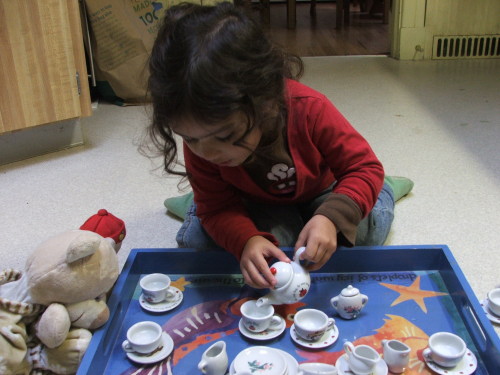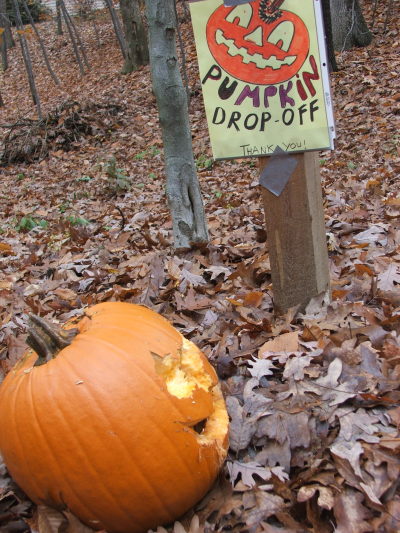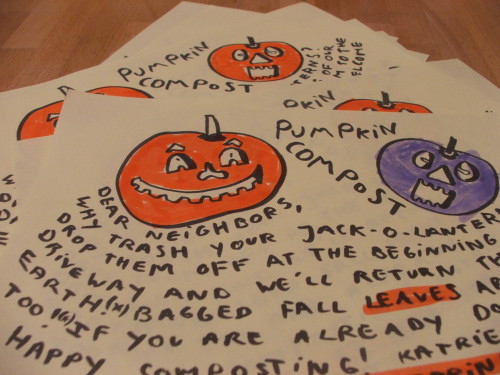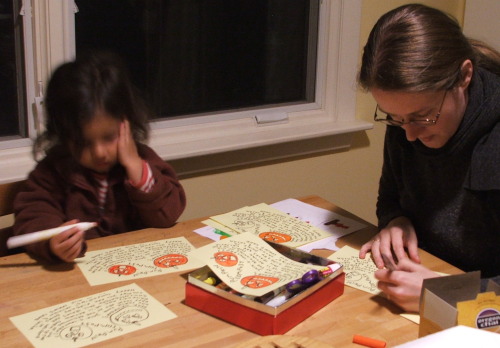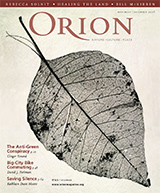Tea party on the kitchen floor with “Pooh Bear” (the bear to the left: I know, he doesn’t look like Pooh to you, but he does to her!), Caillou, and (outside the picture) Gloria (another bear) and Roo (her kangeroo). It was a rainy afternoon but I didn’t have to turn on the light, or doctor the photo afterwards. I love my new bright kitchen!
Pumpkin Compost
Yesterday our first pumpkin orphan was brought to us! Amie and I were just coming up the street froma beautiful Fall walk/bike (can you believe this weather: it’s 9 November and 60F!) and we saw an elderly man cradling a big pumpkin approach our mailbox. He put it down so gently near the sign we put up. We waved in thanks and he waved back. Another neighbor was just driving by and stopped to chat, saying she loved the idea! I was quite relieved: I wasn’t sure how the initiative would be received.
All the beech leaves are falling now too: of the big trees they’re about the last to release their leaves. Everywhere is littered with so many leaves you can hardly distinguish the street from the drivewaysfrom the gardens. Yesterday I saw, for the first time, the moon from our bedroom window, unobstructed by the thick canopy that usually surrounds us. It was a magical moment.
Requesting Pumpkins for Composting
Tomorrow we’re dropping these leaflets in every neighbor’s mailbox.
I should have handed them out as we went trick or treating – ah well, next year. We’re sure to snag a couple of pumpkins and leaves this time around, tomorrow we’ll also get a nice Fall Walk out of it, and Amie and I had great fun coloring in the pamphlet. DH happened to snap a picture (it’s not often you see Mama too!):
Riot Update on Trash, and Compost
- Trash
Trying to establish our trash baseline for the Riot was pretty easy. I weiged the garbage as it was being transferred from the small pail under the sink to our boxes outside (handy for taking to the landfill once a month). In one week – and it was a pretty typical week – we produced 3 lbs. of garbage.
That’s 1 lb. of trash a person a week, or 0.15 lb a person a day.
The average American generates about 4.5 lbs of garbage per person, per day. A 90% reduction would mean .45 lbs of garbage so we’re good there.
I’m not writing this to blow my own horn. It’s just a matter of accounting and of showing that while we might sigh over some of the 7 categories for reduction (our weak points are electricity and heating) there are categories where we do well and that give us courage.
Actually, I think our garbage production is nothing out of the ordinary. In fact, it could be less if I also shunned food and things wrapped in un-recyclable plastics. I haven’t been doing nearly enough of that yet.
- Compost
Composting helps, of course. Imagine dumping all those half-eaten and rotten but still huge and heavy jack-o-lanterns into the garbage bin. There’s a good ten pounds right there!
Thinking about that while cutting up our own two pumpkins for the compost, I thought of an initiative: tomorrow I will deliver into each of my neighbor’s mailboxes a note asking them not to trash their pumpkins, but to deposit them on our driveway so we can compost them. Every evening I’ll collect them and cut them up and put them in the bin. Should be fun (seeing all those Halloween designs), neighborly, and productive as well!
I also contacted the nearest Starbucks and asked if we could have their coffee grounds. No problem! I have no idea how much it will be. The first loot is coming in this evening, so we’ll know soon. It doesn’t even cost us anything to pick it up: DH drives past it on his way to and from the shuttle.
Update: DH came home with 30 lbs of coffee grounds!
Off the Market: Freecycle
My DH can be a funny one. This morning when happening to pass by this here blog (he was so nice to install the new WordPress for me, and that gimicky category cloud to the right), he caught a glimpse of the post on the War on Consumption. And he said:
– What? You passing out economic advice now?
I had to laugh (you would too if you knew my head for numbers). But then I said:
– No! Non-economic advice!
And I meant it.
I was investigating if Freecycle is also active in Europe, thinking I would ask one of my friends there to start a group if it wasn’t. I found Freecycle groups for Antwerp, Brussels, etc., but also found that most hadn’t seen action in over a week. I was shocked and immediately fired off an email to all my friends and family in Belgium, telling them about this wonderful institution.
My dad responded that there already is a way of getting rid of one’s stuff and attaining them as second-hand goods, called the Kringloopwinkel, which means, literally, the Cyclic Shop. From what I understand, there are quite a few of them around. You drop off your stuff at the shop, for free or for some small some, and for some neighborhoods the shop will come and pick up as well, for free. Sometimes they also clean or fix these things up. Then they are sold to the shop’s visitors at a low price. Dad said that that’s probably why Freecycle hasn’t caught on.
Ah, good! But then: wait a minute. It’s not the same. The Kringloopwinkel is a fantastic initiative, but there are some big differences with Freecycle.
(1) For one, Freecycle has no middle man, no shop or organization. It’s just a free and easy Yahoo Group run by a volunteer who scans for spam and once in a while reminds everyone of the rules. No middleman means no costs.
(2) No money exchanges hands. Everything is Free (also free to get rid of).
(3) Takers usually come and pick up the stuff at the givers’ house. No trip to the shop, no trip from the shop. So less gasoline consumption.
Fundementally, the big difference between the Kringloopwinkel and Freecycle is that the first is part of the economy, while Freecycle stands outside it.
What is it that so appeals to me about being “outside” the market? Many things, like it being less costly to one’s wallet and the environment. But it’s primarily this: human contact.
DH and Amie and I have been getting a lot of good, useful things through our local Freecycle and we have started offering too. In most cases there has been an extra: getting to know the people giving it away, chatting with them, in many cases exchanging cards and planning to meet again. There is no money exchange in between, no “professionalism”. We are locals meeting face-to-face and our “thanks!” and “you’re welcome”-s are always 100% heartfelt.
Thanks for Freecycling!
Sit a Spell
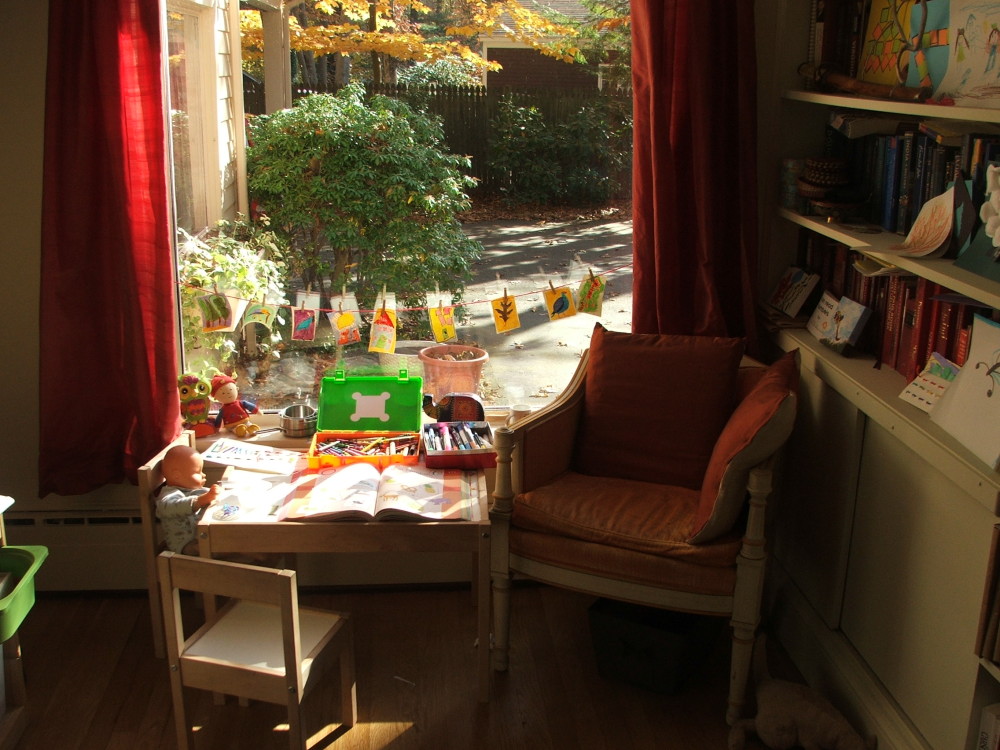
I just submitted this picture to the Sit a Spell pool at Flickr (started by SouleMama and Blue Yonder). This is where I sit (in the larger of the two chairs) while my daughter draws or writes. I play with her, we chat, or I read my own book, or just look outside at the Fall colors (at the moment), and sometimes I draw her in my journal.
The War of Consumption and What to Say to Friends about “the Good Life”
Yesterday one of the headlines in Google was “Economy Contracts as Consumers Retreat“. There is a nice rhythm to that phrase, don’t you think? And, also like a good line of poetry, it says a lot in the most subtle of ways. The bellicosity of this phrase reveals what we all really know about consumption in a more-is-more, me-firs, “free” market: it’s a battlefield.
Who are these consumers at war with on this field, and to whom are they losing the upper hand? And where can they retreat to, to which safe haven?
Since beginning the Riot 4 Austerity I have had some conversations with friends and family members about reducing one’s footprint. I’ve noticed a couple of things. First, that invariably the first two questions from family members are: (1) Are you in financial trouble? (2) Isn’t 64 F (17 C) too cold? No to both. That was easy.
But friends have more complicated, diverse reactions. They run the gamut of (1) a smile (you-goofy/silly-people-now-on-to-a-different-topic) to (2) “why on earth would you deprive yourself of Coke and cable”, to (3) “I really admire that but we just can’t do it like you”. So far I am ashamed to say that I haven’t made any convert, but then again I’m so non-confrontational I am probably the lamest activist you’ve ever met!
But here’s the thing: I get the sense that none of my friends are happy in their role as consumers, to which they choose, nevertheless, to cling. I have the feeling that they all long for something different than a life on the battlefield/market. I have heard them talk of their need for something spiritual, a different kind of riches. For a return to daily rituals of comfort and belonging, like they remember from their childhood perhaps (because most children, if you let them, are so naturally at home with themselves). And for time: time to be at home with oneself and one’s family, time to reflect on something beautiful, to read a book, time for friendship. Time that is not hurried, not stuffed up with stuff, but calm and warm and ample.
They want these intangibles (a nice way of avoiding calling them “things”), but they seem to deny that the only way to get them back is by taking them back from the mass marketplace. Because in my honest opinion, that’s where we have traded them in, our time most of all, for stuff, for plastics, for vapid “entertainment,” for glossy magazines and a glossier, paper thin life.
The mass marketplace where we are at war. The “economy shrinks” as we “retreat” from a battlefield: what does that mean? The newspapers and politicians and Wall Street investors would have us believe that it means that we are losing jobs, so money, so stuff, so happiness. They would have us believe that the only way to win it back is to ratchet up our consumption again, to “have confidence in the market”. They want us to believe that the enemy is the Chinese toymaker, the Euro, the Japanese car manufacturer and the Indian telemarketer. And they want it to be taken for granted that our retreat can only be temporary and that a victorious recovery just around the corner. That there is no other place to be.
But I believe that we are really at war in that field with our worst enemy: ourselves. We have been pitched against ourselves. No wonder no one can win. And even if the market recovers, “victory” is only Pyrrhic. Pyrrhus after winning one of many battles said that one more such victory would utterly undo him. It’s the same with us, only worse. I’m saying that we have already been completely undone.
I’m not just talking about global warming, peak oil, and all those “obstacles” to economic growth and ultimately, of course, our self-preservation. I am talking also of our loss of our “spiritual needs.” Yes, let’s name them: love, home, kindness, peace, and time. I believe that’s what my friends have been saying, suffering. Not the loss of stuff, but of soul.
And no marketplace is going to return these to us.
There are many other ways to recovering happiness. By avoiding the mall and the box store, and saving the money for something more permanent and less polluting to the body and the mind (a woodburning stove, in our case), or for a sense of security at least. By coming together every evening in the kitchen, cooking together and then sharing the meal at the dinner table. By congregating in the living room, telling stories and listening to music or discussing a book, and playing board games or making art together. By staying home, going for a walk in the woods and listening to the birds. By counting what we consume in energy and goods and how much we trash our planet, and reducing those. By planning our garden, our self-sufficiency.
By knowing where we stand, as a family, on that marketplace: more and more on the sideline, less and less at war with ourselves.
Riddles for the Novel (Potboiler)
Sewing for Beginners
Amie has taken up sewing. So far we’ve kept it simple: I fold a piece of thick paper several times across and along the folds I cut some holes. Then I put some colorful yarn in a huge plastic needle, tie a knot at both ends and off she goes. She’s not always sure where to put the next stitch and has to fight the urge to skip ahead (don’t we all?). So I came up with the device of putting a red dot on the hole on the side of the paper where the needle needs to go in.
It still takes a lot of concentration!
The new Orion Magazine came in the mail today so the next couple of days are days of concentration and quiet inspiration. I can now ask Amie “can you play by yourself for half an hour? Mama needs to read,” and she’ll say “of course,” and 15 minutes later she’ll ask me if I’m done, and that’s cool. When she’s gone to sleep I read the sumptuous, hope-giving words: “beloved place,” “baseline of honesty,” “measure and proportion”… If you can put it in words, surely it can be a reality?
Pumpkin Carving
Over the weekend Amie watched with fascination as a friend carved this big pumpkin. Isn’t it spooky!
She couldn’t wait to carve one herself. We compromised: she could “design” the face (draw it on the pumpkin) but Mama would do the actual carving, under her direction of course.
Compared to the skullish one, hers looks so cute and golly.
